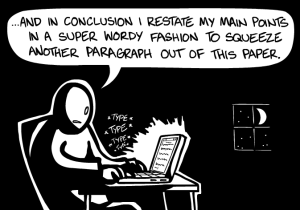 Many writers just getting their start like to investigate the writing process of other authors. It’s a great way to learn as well as figure out what works and doesn’t work for you in particular.
Many writers just getting their start like to investigate the writing process of other authors. It’s a great way to learn as well as figure out what works and doesn’t work for you in particular.
I currently write full time. I’ve found that many who are just getting started, think that means writing for an hour or two, and then playing on Facebook for the afternoon. In my experiences, if one is serious about writing, you have to treat it like an actual job. If you can’t put in the hours, you’re going to struggle with getting the results you want.
That doesn’t mean that you have to immediately quit your career to write 40 hours a week. Paying the bills is important. But it does mean you have to write everyday. Even ten minutes on the bus commuting or fifteen minutes before you tuck the kids in at night counts! Cell phone apps make this so much easier than it used to be. Take advantage of it! I’ve even been known to use the Dragon app to speak my writing while commuting.
I am fortunate that Amazon pays my husband well enough for me to write full time now. I found when I was teaching computer classes, I’d spend 50-60 hours a week working, and by the time I got home and finished grading papers or countless other work related tasks, I was exhausted. Writing just didn’t happen for long stretches of time. I’d get a spurt of energy and write for a few weeks, then fall off the wagon. It happens to everyone. The haphazard writing schedule I kept, resulted in my finishing about one book a year. It wasn’t getting me anywhere and as such, it was time to jump to full-time writing. This, of course, requires me to be accountable for myself. Butt in seat. Writing daily.
So what is my process?
When I first started writing full time, I spent about 6 hours a day writing, which resulted in two novels finished in a span of 3 months. It was grueling and by the end of it, I was drained. Now, I break up my time and try to balance it all a bit more.
I spent my writing time doing five things: writing, editing/revising, critiquing, researching, and networking/promoting.
The first two of that list make up about 85% of my time, and I put in 7-8 hours a day into the ‘job.’
Monday through Friday, I spent my mornings writing and my afternoons editing/revising. I check my email and do whatever networking and promoting is needed after I have spent at least 7 hours on the writing and editing portions. Social networking can be a great place to promote your material, which is important, but it can also suck you into wasting time. On the weekends, I put in 3-4 hours total on critiquing novels and short stories from the members of my local critique group. I also try to write at least 15 minutes on Saturday and Sunday. And that’s my week.
I use Excel to track my hours because honestly, I’m curious. I want to see how many hours I spend actually working. So far the spreadsheet shows the breakdown above. I plan to keep it that way and see what my totals look like by the end of the year.
While I mostly write science fiction and fantasy, occasionally I do venture into other genres such as young adult, mystery, and thriller. I am currently finishing revisions on four novels and one short story. If you are interested in becoming a beta reader for these, feel free to drop me a line at beta [at] ravenoak [dot] net.
Besides the five ‘almost done’ works, my writing time focuses on writing one novel at a time, though I do have twenty-one novels in various stages of the writing process. After I finish one, it will rotate into the revision/editing afternoon, and I’ll pick up another book from the stack to finish. Or I’ll come up with something new altogether and work on that. It’s a never ending cycle that I greatly enjoy!
Writer’s Block??
I don’t get it often. I used to. When I didn’t write often and daily, I would get it all the time. I had a tendency to get struck by writer’s block when I didn’t thoroughly plan out my novels. Some people swear by the “Pantsing It” method, but it doesn’t work for me. If I don’t have a clear direction on where I’m going and why, I get stuck and rightly so. Using Scrivener has helped immensely with this!
Another tip that helps is that I have quite a few novels ready to write. In a worse case scenario, if I feel stuck, I can hop over to writing something else for a bit until my brain unsticks itself. Usually with enough writing on something else, the plot problem will jiggle loose, and I’ll be able to return to the original novel at hand.
Do I listen to music as I write?
It seems almost stereotypical these days that authors listen to music when writing, doesn’t it? I do listen to music, but most of the time, it is music without words. If I listen to the radio or music with lyrics, I tend to get caught up in singing along or dancing, which is not really conducive to writing. When I write, I have setlists created in iTunes that are named by mood. For example, my “sad” list is music that makes me sad. I put that on when I’m writing a sad scene and it helps cement the mood of the scene. I have “Action” and “Scary,” as well as “Love,” “Happy,” and “Angry.” There are a few others in there as well.
The music I use to create the setlists is mostly movie score/soundtrack songs. In particular, I really enjoy the following soundtracks:
- Braveheart Score
- Lord of the Rings Movie Scores
- Robin Hood: Prince of Thieves Score
- Man on Fire Score
- Ghost in the Shell: SAC Soundtracks 1-3
- Cold Case Soundtracks
- Labyrinth Score
- Kill Bill Soundtracks

2 Replies to “Writing Process”